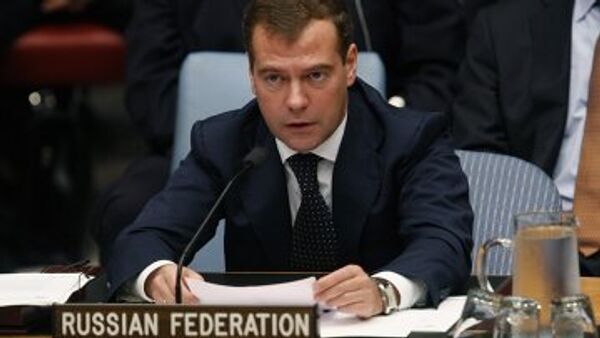UNITED NATIONS, September 24 (RIA Novosti) - Russia and the United States are discussing the possibility of slashing the number of nuclear weapon delivery vehicles by over 67%, Russian President Dmitry Medvedev said Thursday.
"We are ready to move further and cut the number of delivery vehicles for strategic offensive armaments by more than three times, and this issue is now being discussed at the negotiating table with our American partners," Medvedev told the UN Security Council Summit on Nuclear Non-Proliferation and Nuclear Disarmament.
Medvedev said Wednesday after talks with his U.S. counterpart Barack Obama that a new Russian-U.S. strategic arms reduction treaty is likely be ready in time. Today he reiterated: "We are doing everything possible to sign a relevant document by December."
Medvedev and Obama agreed in July in Moscow on the outline of a deal to replace the 1991 Strategic Arms Reduction Treaty (START-1), which expires on December 5, including cutting their countries' nuclear arsenals to 1,500-1,675 operational warheads and delivery vehicles to 500-1,000.
The START-1 treaty obliges Russia and the U.S. to reduce nuclear warheads to 6,000 and their delivery vehicles to 1,600 each. In 2002, a follow-up agreement on strategic offensive arms reduction was concluded in Moscow. The document, known as the Moscow Treaty, envisioned cuts to 1,700-2,200 warheads by December 2012.
According to a report published by the U.S. State Department in April, as of January 1 Russia had 3,909 nuclear warheads and 814 delivery vehicles, including ground-based intercontinental ballistic missiles (ICBM), submarine launched ballistic missiles (SLBM) and strategic bombers. The same report said the United States had 5,576 warheads and 1,198 delivery vehicles.
Medvedev also said Russia was ready to work jointly with the United States on "missile proliferation challenges." "We hope all other interested countries will also join this work," he said.
Medvedev outlined a number of priorities. "First, it's necessary to continue improving and strengthening the global regime of nonproliferation and disarmament. International mechanisms, first of all, the Nuclear Non-Proliferation Treaty, remain a support here," he said.
Medvedev also said the International Atomic Energy Agency's safeguards system should be developed, and said the leading countries should sign and ratify the Comprehensive Nuclear Test Ban Treaty.
The Russian leader urged new nonproliferation mechanisms to be used more actively, including Resolution 1540 on nonproliferation of weapons of mass destruction (WMD), adopted on the proposal of Russia and the U.S.
Medvedev said countries should implement civilian nuclear programs while strictly abiding by nonproliferation agreements.
Obama, who chairs the UN Security Council summit, called on the world again to unite to prevent proliferation of weapons of mass destruction.
The UN Security Council secretary general welcomed the steps of Russia and the U.S. on the road to nuclear disarmament, urging other countries to follow suit.


